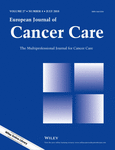Core components of Communication Skills Training in oncology: A synthesis of the literature contrasted with consensual recommendations
Abstract
This systematic review synthesises the literature on Communication Skills Training (CST) programmes for oncology professionals to identify their core components and compare them with the recommendations formulated in a position paper based on a European expert consensus meeting. A systematic literature search was conducted using MEDLINE (OVID and PUBMED), CINAHL, EMBASE, PSYCHINFO, Web of Science and the Cochrane Library. The analytic approach relied on an a priori framework based on the position paper's recommendations, generating several themes. Forty-nine articles were included. The CST programmes reported between 2010 and 2016 were heterogeneous. Some recommendations, especially those regarding content and pedagogic tools, were followed by most providers, while others, such as setting, objectives and participants, were not. This synthesis raises questions on how CST programmes are conceived and how they could or should be conceived in future. While medicine, especially clinical communication, is socially and culturally embedded, some recommendations regarding CST programmes seem to be universally valuable, contributing to ensure quality and enhanced credibility, and thus endorsement and sustained implementation, of CST programmes in the oncology setting.




